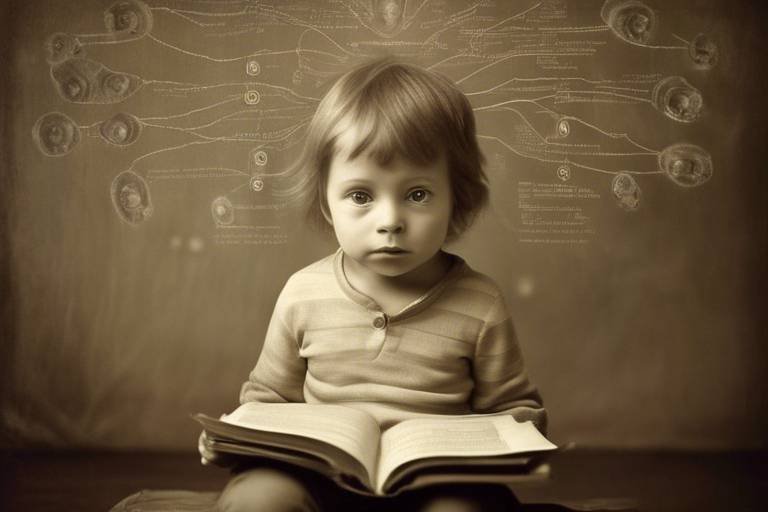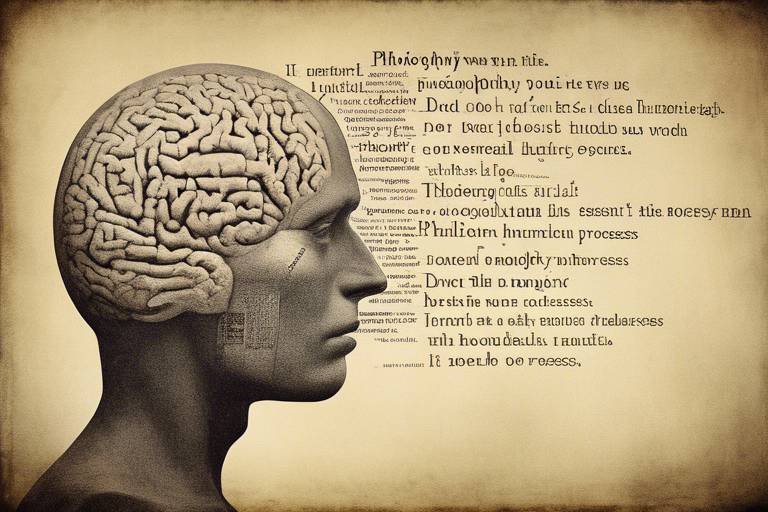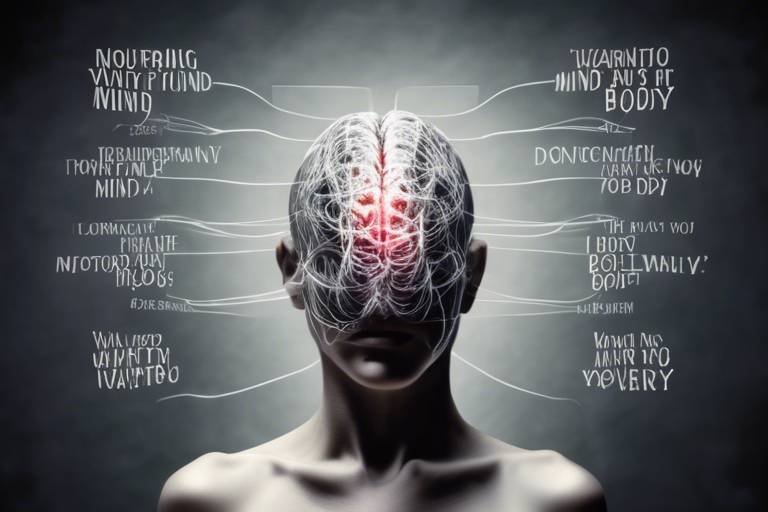The Constituents of Human Mind
The human mind is a fascinating and intricate entity, a complex tapestry woven from various threads of cognition, emotion, and consciousness. Each of these elements interacts dynamically, influencing our thoughts, behaviors, and ultimately, our very existence. To understand the constituents of the human mind is to embark on a journey that reveals not just how we think, but also how we feel and perceive the world around us.
Imagine the mind as a grand orchestra, where each section plays its part to create a harmonious symphony. The cognitive processes serve as the rhythm section, laying down the beat of our perception, memory, and reasoning. Meanwhile, the emotional intelligence acts as the strings, adding depth and nuance to our experiences. Finally, consciousness is like the conductor, guiding the performance and ensuring that all the elements come together in a cohesive manner.
Understanding these components is crucial for anyone looking to enhance their personal development or improve their interpersonal relationships. It's not just about knowing what they are; it's about recognizing how they interact and influence each other. For instance, our emotions can shape our cognitive processes, leading to decisions that may not always be rational. Alternatively, heightened self-awareness can allow us to manage our emotions better, leading to improved decision-making and relationships.
As we delve deeper into each constituent, we will uncover how they contribute to our daily lives, shaping our interactions and guiding our choices. From the way we perceive challenges to how we empathize with others, understanding these elements can lead to a more fulfilling and connected existence. So, let’s explore the intricate workings of the human mind and discover the power it holds.
Cognitive processes are the mental activities that encompass how we perceive the world, store and retrieve memories, and engage in reasoning. These processes are fundamental to our ability to learn and make decisions in our everyday lives. For example, when you encounter a new situation, your mind quickly assesses the information at hand, drawing from past experiences and knowledge to formulate a response. This intricate dance of thought allows us to navigate the complexities of life with relative ease.
Consider the following cognitive processes:
- Perception: How we interpret sensory information.
- Memory: The ability to store and recall information.
- Reasoning: The process of drawing conclusions based on available information.
By understanding these processes, we can enhance our learning strategies and improve our decision-making skills. Whether it’s studying for an exam or choosing a career path, being aware of how we think can lead to more effective outcomes.
Emotional intelligence is a vital aspect of our mental makeup, encompassing the ability to recognize, understand, and manage our own emotions and those of others. This skill is crucial for effective communication and fostering meaningful relationships. Think of emotional intelligence as the glue that holds our social interactions together, enabling us to connect with others on a deeper level.
At the core of emotional intelligence lies self-awareness. This foundational skill allows individuals to recognize their emotions and understand how these feelings influence their thoughts and behaviors. Self-awareness is like holding a mirror to oneself, reflecting not just our feelings but also our motivations and biases. This insight is essential for personal development and enhances our ability to relate to others.
Self-awareness significantly influences our decision-making process. When we understand our emotions, we can evaluate our motivations more clearly, leading to more informed and balanced choices. Imagine making a decision while fully aware of your emotional state; it’s like having a GPS guiding you through a complex maze, helping you avoid pitfalls and navigate toward your goals.
Developing self-awareness can be achieved through various strategies, including:
- Mindfulness practices: Engaging in meditation or focused breathing exercises.
- Reflective journaling: Writing down thoughts and feelings to gain clarity.
- Seeking feedback: Asking others for their perspectives on your behavior.
These practices contribute to personal growth and emotional regulation, ultimately enhancing our emotional intelligence.
Empathy is another crucial component of emotional intelligence, involving the ability to understand and share the feelings of others. It’s the bridge that connects us to those around us, fostering compassion and enhancing social interactions in both personal and professional settings. When we empathize with others, we create a supportive environment that encourages open communication and understanding.
Consciousness refers to our awareness of thoughts, feelings, and surroundings. It is a complex aspect of the mind that influences our perception of reality and our interactions with the world. Think of consciousness as the stage on which our thoughts and emotions perform, shaping our experiences and how we relate to the world.
The levels of consciousness range from full awareness to deep sleep, impacting how we process information and respond to stimuli. Understanding these levels can enhance our self-regulation and mindfulness. For instance, being aware of the different levels can help us recognize when we are distracted or not fully present, allowing us to refocus our attention.
Altered states of consciousness, such as those induced by meditation or substances, can provide unique insights into the workings of the mind. These states can enhance creativity and problem-solving abilities, offering a fresh perspective on challenges we face. Exploring these altered states can be akin to stepping into a new dimension, where the usual boundaries of thought and perception are expanded.
Q: What are the main constituents of the human mind?
A: The main constituents include cognitive processes, emotional intelligence, and consciousness.
Q: How can I improve my emotional intelligence?
A: You can improve emotional intelligence by developing self-awareness, practicing empathy, and engaging in mindfulness activities.
Q: What is the role of consciousness in our daily lives?
A: Consciousness influences our awareness of thoughts and feelings, shaping our interactions and decisions in everyday situations.

Cognitive Processes
Cognitive processes are the mental activities that encompass a wide range of functions, including perception, memory, reasoning, and decision-making. To put it simply, these processes are like the gears of a clock, working together to help us understand the world around us and navigate through our daily lives. Think about it: every time you make a decision, recall a memory, or solve a problem, you're engaging in cognitive processes. It's fascinating how these mental activities shape our experiences and influence our behaviors.
At the core of cognitive processes lies perception, which is our ability to interpret sensory information from our surroundings. For instance, when you see a beautiful sunset, your brain is not just receiving visual data; it's processing colors, shapes, and even emotions associated with that moment. This perception is crucial because it lays the foundation for memory. Memory, in turn, allows us to store and retrieve information, helping us learn from past experiences.
Another important aspect of cognitive processes is reasoning. This is the mental leap we take when we analyze information, draw conclusions, and make decisions. Reasoning can be deductive, where we apply general principles to specific cases, or inductive, where we form generalizations based on specific observations. For example, if you've noticed that your friend always wears a red shirt on Fridays, you might reason that they have a favorite color or a specific routine. This ability to reason not only helps us solve problems but also aids in critical thinking.
In the realm of cognitive processes, it's essential to recognize how these elements interplay. For instance, when we encounter new information, our perception kicks in, allowing us to absorb and interpret it. This information then gets stored in our memory, which we can later retrieve to inform our reasoning and decision-making. It's like a cycle: perception feeds memory, memory enhances reasoning, and reasoning guides our decisions.
To better understand the components of cognitive processes, let's take a look at the following table that summarizes their key elements:
| Component | Description |
|---|---|
| Perception | The process of interpreting sensory information. |
| Memory | The ability to store and retrieve information. |
| Reasoning | The mental process of drawing conclusions and making decisions. |
Moreover, cognitive processes are not just isolated activities; they often overlap and influence one another. For instance, when you learn a new skill, your perception helps you understand the task, your memory retains the steps involved, and your reasoning allows you to improve and adapt your approach. This interconnectedness highlights the complexity of the human mind and underscores the importance of cognitive processes in shaping our thoughts and behaviors.
In conclusion, understanding cognitive processes provides valuable insights into how we learn, make decisions, and interact with the world. By recognizing the significance of perception, memory, and reasoning, we can enhance our cognitive abilities and improve our overall quality of life. So, the next time you find yourself pondering a decision or recalling a cherished memory, take a moment to appreciate the intricate workings of your mind!

Emotional Intelligence
Emotional intelligence is an essential skill that goes beyond mere cognitive abilities. It is the ability to recognize, understand, and manage not only our own emotions but also those of others. Imagine walking into a room filled with people; the atmosphere is charged with various emotions. Some individuals are excited, while others may be feeling anxious or upset. How you navigate this emotional landscape can significantly impact your interactions and relationships. By honing your emotional intelligence, you can enhance your ability to communicate effectively, resolve conflicts, and foster meaningful connections.
At its core, emotional intelligence is about being aware of emotions—both yours and those around you. This awareness allows for a deeper understanding of what drives people's behaviors and reactions. Think of it as having a superpower: the ability to sense the emotional undercurrents in a situation. This skill is crucial not only in personal relationships but also in professional settings, where teamwork and collaboration are vital. When individuals can empathize with one another, they create a supportive environment that encourages open communication and trust.
Emotional intelligence can be broken down into several key components, including:
- Self-awareness: Recognizing your own emotions and their impact on your thoughts and behaviors.
- Self-regulation: The ability to manage your emotions in a healthy way, preventing impulsive reactions.
- Motivation: Harnessing your emotions to pursue goals with energy and persistence.
- Empathy: Understanding and sharing the feelings of others, which is vital for building connections.
- Social skills: The ability to navigate social complexities and maintain healthy relationships.
Each of these components plays a significant role in how we interact with the world. For instance, self-awareness allows you to identify when you are feeling stressed or overwhelmed, enabling you to take proactive steps to manage those feelings. Self-regulation helps you respond thoughtfully rather than react impulsively, which can be especially important in high-pressure situations.
Moreover, emotional intelligence is not a fixed trait; it can be developed and enhanced over time. Engaging in activities that promote emotional growth, such as mindfulness practices, can lead to improved self-awareness and regulation. Reflective journaling is another powerful tool, allowing individuals to explore their emotions and reactions in a safe space. Seeking feedback from friends or colleagues can also provide valuable insights into how your emotions affect your interactions.
In essence, emotional intelligence is about more than just understanding emotions; it is about leveraging that understanding to improve your life and the lives of those around you. It is the glue that holds relationships together, fostering a sense of community and belonging. As you cultivate your emotional intelligence, you will find that your interactions become more fulfilling and your relationships more resilient.
- What is emotional intelligence? Emotional intelligence is the ability to recognize, understand, and manage our own emotions and the emotions of others.
- Why is emotional intelligence important? It is crucial for effective communication, building relationships, and managing stress and conflict.
- Can emotional intelligence be developed? Yes, emotional intelligence can be cultivated through practices like mindfulness, reflective journaling, and seeking feedback.
- How does emotional intelligence impact decision-making? High emotional intelligence allows individuals to evaluate their motivations and biases, leading to more balanced and informed choices.

Self-awareness
Self-awareness is often described as the cornerstone of emotional intelligence. It’s that internal compass that guides us through the maze of our emotions and thoughts. Imagine trying to navigate a dense forest without a map or a clear sense of direction; that’s what life feels like without self-awareness. It’s the ability to step back and observe our own feelings, thoughts, and behaviors as if we were an outsider looking in. This perspective not only helps us understand ourselves better but also shapes how we interact with the world around us.
When we become more self-aware, we start to recognize patterns in our behavior and how our emotions influence our actions. For instance, have you ever reacted to a situation and later thought, "Why did I do that?" This moment of reflection is a glimpse into self-awareness. It allows us to evaluate our motivations and understand the underlying reasons for our reactions. This understanding is crucial because it opens the door to personal growth and healthier relationships.
One of the most significant benefits of self-awareness is its impact on our decision-making processes. When we are aware of our emotions and biases, we can make choices that are not just reactive but thoughtful and informed. For example, if you recognize that you tend to feel anxious during public speaking, you can take proactive steps to manage that anxiety, such as practicing mindfulness or seeking feedback from trusted friends. This leads to a more balanced approach to decisions, whether in personal life or professional settings.
To enhance self-awareness, consider incorporating various strategies into your daily routine. Here are a few effective methods:
- Mindfulness Practices: Engaging in mindfulness activities like meditation can help you tune into your thoughts and feelings, fostering a greater understanding of your inner self.
- Reflective Journaling: Writing down your thoughts and feelings can provide clarity and insight into your emotional landscape, making it easier to identify patterns and triggers.
- Seeking Feedback: Asking for constructive feedback from others can offer perspectives you might not see on your own, enriching your understanding of how you are perceived and how your actions affect those around you.
In essence, self-awareness is a journey rather than a destination. It requires continuous effort and a willingness to confront uncomfortable truths about ourselves. But the rewards are profound—better relationships, improved decision-making, and a deeper understanding of our place in the world. So, the next time you find yourself in a moment of self-reflection, embrace it. It’s a powerful step towards becoming the best version of yourself.
Q: What is self-awareness?
A: Self-awareness is the ability to recognize and understand your own emotions, thoughts, and behaviors, and how they influence your interactions with others.
Q: How can I improve my self-awareness?
A: You can improve your self-awareness through mindfulness practices, reflective journaling, and seeking constructive feedback from others.
Q: Why is self-awareness important?
A: Self-awareness is crucial because it influences your decision-making, enhances your emotional intelligence, and fosters healthier relationships.

Impact on Decision-Making
Self-awareness plays a **crucial role** in decision-making, acting as a guiding light that helps individuals navigate through the complexities of their choices. When we are self-aware, we can better evaluate our motivations and biases, which ultimately leads to more informed and balanced choices. Imagine standing at a crossroads, with one path leading to a well-trodden route and the other to an uncharted territory. Your self-awareness is like a compass that helps you discern which path aligns with your values and long-term goals.
Moreover, self-awareness allows us to recognize our emotional triggers and how they might cloud our judgment. For instance, if you’re aware that stress makes you impulsive, you can take a step back during high-pressure situations to ensure that your decisions are not merely reactions to your current emotional state. This kind of regulation is essential for effective decision-making, especially in situations where the stakes are high.
Consider the following aspects of how self-awareness impacts decision-making:
- Understanding Personal Biases: By being aware of our biases, we can actively work to counteract them. This self-reflection can lead to more objective decision-making.
- Emotional Regulation: Self-aware individuals are better equipped to manage their emotions, which helps in making rational decisions rather than emotional ones.
- Enhanced Relationships: When we understand our emotions, we can communicate our needs and concerns more effectively, leading to better collaboration in group decisions.
Furthermore, self-awareness fosters a growth mindset, encouraging individuals to view challenges as opportunities for learning rather than insurmountable obstacles. This perspective not only enhances decision-making but also cultivates resilience. When faced with setbacks, self-aware individuals are more likely to analyze what went wrong and adjust their approach for future decisions.
In summary, the impact of self-awareness on decision-making cannot be overstated. It serves as a foundation for understanding our motivations, regulating our emotions, and ultimately making choices that align with our true selves. By cultivating self-awareness, we can transform our decision-making process from a reactive instinct to a thoughtful and deliberate practice.
- What is self-awareness? Self-awareness is the ability to recognize and understand your own emotions, thoughts, and behaviors, and how they affect others.
- How does self-awareness improve decision-making? It helps individuals evaluate their motivations and biases, leading to more informed and balanced choices.
- Can self-awareness be developed? Yes, self-awareness can be enhanced through practices such as mindfulness, reflective journaling, and seeking feedback from others.

Strategies for Improvement
Improving self-awareness is not just a trend; it's a vital skill that can transform your life in remarkable ways. Think of self-awareness as the compass guiding your journey through the complex landscape of emotions and thoughts. Without it, you might find yourself lost, reacting to situations without understanding the underlying reasons. So, how do we sharpen this compass? There are several effective strategies to enhance self-awareness, and they can be both simple and profound.
One of the most powerful tools for developing self-awareness is mindfulness practices. Mindfulness involves being present in the moment and observing your thoughts and feelings without judgment. Imagine sitting quietly, focusing on your breath, and noticing how your mind wanders. This practice not only calms your mind but also allows you to recognize patterns in your thinking and emotional responses. Over time, this awareness can lead to a more balanced perspective on life.
Another effective strategy is reflective journaling. By putting pen to paper, you create a space to explore your thoughts and feelings in depth. This can be as simple as writing down your daily experiences or reflecting on specific emotions you felt throughout the day. The act of writing helps to clarify your thoughts and can reveal insights about your motivations and behaviors. It's like holding a mirror up to your mind, allowing you to see what you might otherwise overlook.
Additionally, seeking feedback from others can be incredibly enlightening. Often, we are blind to our own behaviors and how they impact those around us. By asking trusted friends, family, or colleagues for their perspectives, you can gain valuable insights into your emotional responses and interactions. This feedback can serve as a catalyst for personal growth, helping you to identify areas for improvement.
Incorporating these strategies into your daily routine can significantly enhance your self-awareness and emotional regulation. Consider setting aside a few minutes each day for mindfulness, dedicating time each week for journaling, and engaging in open conversations with those you trust. As you embark on this journey towards greater self-awareness, remember that it's not about perfection but rather about progress. Each step you take brings you closer to understanding yourself and navigating life's challenges with confidence.
- What is self-awareness? Self-awareness is the ability to recognize and understand your own emotions, thoughts, and behaviors, and how they influence your interactions with others.
- How can mindfulness improve self-awareness? Mindfulness helps you stay present and observe your thoughts and feelings without judgment, allowing you to gain insights into your emotional responses.
- Why is reflective journaling important? Reflective journaling provides a space to explore and clarify your thoughts and emotions, revealing patterns that can enhance self-awareness.
- How can I seek feedback effectively? Approach trusted individuals and ask specific questions about your behaviors and emotional responses, being open to their perspectives.

Empathy
Empathy is one of those magical ingredients that can transform our interactions from mundane to meaningful. It's more than just a buzzword; it’s the ability to step into someone else's shoes and truly feel what they are experiencing. Imagine walking through a crowded room, and instead of just seeing faces, you can sense the joy, sadness, or anxiety that each person carries. This profound connection is the essence of empathy, and it plays a pivotal role in how we relate to one another.
At its core, empathy consists of two key components: cognitive empathy and emotional empathy. Cognitive empathy is all about understanding another person’s perspective—like seeing the world through their eyes. On the other hand, emotional empathy is feeling what they feel, which can be a rollercoaster ride of emotions. When we blend these two forms of empathy, we create a powerful tool for connection and understanding. It’s like having a superpower that allows us to bridge the gap between ourselves and others.
Empathy is essential for building strong relationships, whether in our personal lives or in the workplace. In fact, studies show that teams with high levels of empathy tend to be more effective and innovative. Why? Because when team members understand and support each other, they can collaborate better, resolve conflicts more efficiently, and create a more positive environment. Think of empathy as the glue that holds a team together, fostering a sense of belonging and trust.
However, cultivating empathy isn’t always easy. It requires practice and a genuine desire to connect with others. Here are some strategies to enhance your empathetic skills:
- Active Listening: Give your full attention to the speaker, and show that you are engaged. Nodding, maintaining eye contact, and asking clarifying questions can help.
- Put Yourself in Their Shoes: Try to visualize what the other person is going through. This mental exercise can deepen your understanding of their feelings.
- Practice Non-Judgment: Approach conversations without preconceived notions. This openness allows for a more authentic connection.
- Share Your Own Feelings: Sometimes, sharing your own experiences can create a safe space for others to open up, fostering mutual understanding.
In conclusion, empathy is a vital component of effective communication and relationship-building. It allows us to connect on a deeper level, fostering compassion and understanding in both personal and professional contexts. By actively working to enhance our empathetic abilities, we not only improve our relationships but also contribute to a more compassionate and understanding world.
Q: What is the difference between empathy and sympathy?
A: While sympathy involves feeling pity or sorrow for someone else's misfortune, empathy goes deeper. It’s about understanding and sharing the feelings of another person, allowing for a more profound connection.
Q: Can empathy be developed?
A: Absolutely! Empathy is a skill that can be cultivated through practice, self-reflection, and active engagement with others. The more we strive to understand others, the more empathetic we become.
Q: Why is empathy important in the workplace?
A: Empathy in the workplace fosters collaboration, enhances communication, and improves team dynamics. It leads to a more positive work environment, where employees feel valued and understood.

Consciousness
Consciousness is a fascinating and intricate aspect of the human experience. It refers to our awareness of thoughts, feelings, and surroundings, acting as the lens through which we perceive reality. Imagine it as the spotlight on a stage, illuminating certain thoughts and emotions while leaving others in the shadows. This dynamic quality of consciousness not only shapes our daily experiences but also influences how we interact with the world around us. Have you ever wondered why some days feel more vibrant and alive than others? That could be a reflection of your consciousness at work!
One of the most intriguing facets of consciousness is its varying levels. These levels can range from full awareness, where we are actively engaged with our environment, to deep sleep, where our awareness is significantly diminished. Understanding these levels can help us navigate our mental states more effectively. For instance, during our waking hours, we might experience heightened consciousness when we’re excited or focused, while in moments of distraction, our awareness can wane, making it harder to concentrate.
The levels of consciousness can be categorized as follows:
- Full Awareness: This is when we are fully engaged with our thoughts and surroundings.
- Daydreaming: A state where our mind wanders, often leading to creative insights.
- Sleep: A necessary state for rest and recovery, where consciousness is significantly reduced.
- Altered States: These can occur through meditation or other practices that shift our usual patterns of awareness.
Another captivating aspect is the concept of altered states of consciousness. These states can be induced through various means, such as meditation, deep relaxation, or even certain substances. They provide unique insights into the workings of the mind, often leading to enhanced creativity and problem-solving abilities. Think of it like opening a door to a different room in your mind, where new ideas and perspectives await discovery. Have you ever experienced a moment of clarity or inspiration during meditation? That’s your consciousness revealing new pathways!
Exploring consciousness can also help us develop a deeper understanding of ourselves. By becoming more aware of our thoughts and feelings, we can learn to manage our responses to various situations. This awareness is crucial for personal growth and emotional regulation. It allows us to respond to challenges with a clearer mind and a more balanced perspective. In a world filled with distractions, cultivating consciousness can be a powerful tool for enhancing our overall well-being.
Q1: What is consciousness?
Consciousness is the state of being aware of and able to think about one's own existence, thoughts, and surroundings.
Q2: How many levels of consciousness are there?
Consciousness can be categorized into various levels, including full awareness, daydreaming, sleep, and altered states.
Q3: Can consciousness be altered?
Yes, consciousness can be altered through practices like meditation, hypnosis, or the use of certain substances, leading to different experiences and insights.
Q4: Why is understanding consciousness important?
Understanding consciousness helps us navigate our thoughts and emotions, enhancing self-awareness and improving decision-making and emotional regulation.

Levels of Consciousness
This article explores the various elements that make up the human mind, including cognition, emotions, and consciousness, and how they interact to shape our thoughts and behaviors.
Cognitive processes refer to the mental activities involved in perception, memory, and reasoning. Understanding these processes helps us grasp how we learn and make decisions in everyday life.
Emotional intelligence encompasses the ability to recognize, understand, and manage our own emotions and those of others. This skill is crucial for effective communication and fostering relationships.
Self-awareness is the foundation of emotional intelligence, allowing individuals to recognize their emotions and how they affect thoughts and behaviors. It plays a key role in personal development and interpersonal relationships.
Self-awareness significantly influences decision-making, as it enables individuals to evaluate their motivations and biases, leading to more informed and balanced choices in various situations.
Developing self-awareness can be achieved through mindfulness practices, reflective journaling, and seeking feedback from others, all of which contribute to personal growth and emotional regulation.
Empathy involves understanding and sharing the feelings of others. It is essential for building connections, fostering compassion, and enhancing social interactions in both personal and professional settings.
Consciousness refers to our awareness of thoughts, feelings, and surroundings. It is a complex aspect of the mind that influences our perception of reality and our interactions with the world.
The levels of consciousness can be likened to a dimmer switch, where the brightness varies depending on our state of awareness. At one end, we have full consciousness, where we are alert and engaged with our surroundings, while at the other end lies deep sleep, where we are entirely unaware of our environment. Understanding these levels is crucial, as they impact how we process information and respond to stimuli.
Here’s a brief overview of the different levels of consciousness:
| Level | Description |
|---|---|
| Full Consciousness | Complete awareness of thoughts, feelings, and environment. |
| Altered States | States such as meditation or hypnosis where perception changes. |
| Subconscious | Part of the mind not currently in focal awareness; influences thoughts and behaviors. |
| Deep Sleep | A state of rest where awareness is minimal, and bodily functions slow down. |
Each level of consciousness serves a purpose, and understanding them can enhance our ability to self-regulate and practice mindfulness. For example, when we are fully conscious, we can make informed decisions and engage meaningfully with others. However, in altered states, we may tap into deeper insights or creativity that can be beneficial in problem-solving scenarios.
Moreover, the transitions between these levels can be influenced by various factors such as stress, fatigue, or even substances. Recognizing when we are shifting from one level to another can empower us to take proactive steps to maintain our desired state of consciousness. This awareness can lead to improved focus and emotional stability, ultimately enhancing our daily experiences.
- What are the main levels of consciousness? The main levels include full consciousness, altered states, subconscious, and deep sleep.
- How can I improve my awareness of these levels? Mindfulness practices, meditation, and reflective journaling can help increase awareness of your consciousness levels.
- Can altered states of consciousness be beneficial? Yes, they can provide unique insights and enhance creativity and problem-solving abilities.

Altered States of Consciousness
This article explores the various elements that make up the human mind, including cognition, emotions, and consciousness, and how they interact to shape our thoughts and behaviors.
Cognitive processes refer to the mental activities involved in perception, memory, and reasoning. Understanding these processes helps us grasp how we learn and make decisions in everyday life.
Emotional intelligence encompasses the ability to recognize, understand, and manage our own emotions and those of others. This skill is crucial for effective communication and fostering relationships.
Self-awareness is the foundation of emotional intelligence, allowing individuals to recognize their emotions and how they affect thoughts and behaviors. It plays a key role in personal development and interpersonal relationships.
Self-awareness significantly influences decision-making, as it enables individuals to evaluate their motivations and biases, leading to more informed and balanced choices in various situations.
Developing self-awareness can be achieved through mindfulness practices, reflective journaling, and seeking feedback from others, all of which contribute to personal growth and emotional regulation.
Empathy involves understanding and sharing the feelings of others. It is essential for building connections, fostering compassion, and enhancing social interactions in both personal and professional settings.
Consciousness refers to our awareness of thoughts, feelings, and surroundings. It is a complex aspect of the mind that influences our perception of reality and our interactions with the world.
The levels of consciousness range from full awareness to deep sleep, impacting how we process information and respond to stimuli. Understanding these levels can enhance self-regulation and mindfulness.
Altered states of consciousness are fascinating phenomena that can occur during various experiences. These states can be induced through a variety of methods, including meditation, hypnosis, and the use of psychoactive substances. When we enter these altered states, our perception of reality can shift dramatically, leading to unique insights and experiences that are often beyond our normal waking consciousness.
For instance, during deep meditation, individuals often report feelings of profound peace, heightened awareness, or even a sense of unity with the universe. This can be likened to stepping into a different realm where the usual boundaries of self dissolve, allowing for a richer understanding of one's thoughts and feelings. Similarly, the use of certain substances can lead to altered perceptions, where colors may seem more vibrant, sounds more profound, or time may feel distorted.
It's important to note that while altered states can offer valuable experiences, they also come with risks. Here are some common methods for inducing altered states:
- Meditation: Practicing mindfulness or transcendental meditation can lead to deep relaxation and altered perception.
- Hypnosis: This technique can create a state of focused attention and increased suggestibility.
- Psychoactive Substances: Certain drugs can alter mood, perception, and cognitive processes, but they should be approached with caution due to potential side effects and legal issues.
Exploring altered states of consciousness can enhance creativity and problem-solving abilities. Many artists, writers, and thinkers have reported breakthroughs while in these states, suggesting that the mind may be able to access deeper layers of insight and inspiration. However, it is essential to approach these experiences responsibly and with an understanding of the potential impacts on mental health.
- What are altered states of consciousness? Altered states of consciousness refer to conditions that differ from normal waking consciousness, often characterized by changes in perception, mood, and cognitive functioning.
- How can I safely explore altered states? You can explore altered states through practices like meditation, breathwork, or guided imagery. Always prioritize safety and mental health.
- Are altered states beneficial? Many people find that altered states can enhance creativity, provide insights, and promote relaxation, but they should be approached with caution.
Frequently Asked Questions
- What are cognitive processes?
Cognitive processes are the mental activities that encompass perception, memory, and reasoning. They help us understand how we learn, make decisions, and interact with the world around us. Think of them as the gears in a clock, working together to keep everything running smoothly in our minds.
- Why is emotional intelligence important?
Emotional intelligence is crucial because it allows us to recognize, understand, and manage our own emotions as well as those of others. This skill enhances our communication abilities and helps build stronger relationships, much like a bridge that connects us to others.
- How does self-awareness affect decision-making?
Self-awareness plays a significant role in decision-making by enabling individuals to evaluate their motivations and biases. When we are aware of our emotions, we can make more informed and balanced choices, leading to better outcomes in various situations.
- What strategies can improve self-awareness?
Improving self-awareness can be achieved through mindfulness practices, reflective journaling, and seeking feedback from others. These strategies act like a mirror, helping us see ourselves more clearly and fostering personal growth.
- What is empathy, and why is it essential?
Empathy is the ability to understand and share the feelings of others. It is essential for building connections and fostering compassion, enhancing our social interactions in both personal and professional settings. Think of it as the glue that holds relationships together.
- What is consciousness?
Consciousness refers to our awareness of thoughts, feelings, and surroundings. It is a complex aspect of the mind that influences how we perceive reality and interact with the world, much like a spotlight shining on our experiences.
- What are the levels of consciousness?
The levels of consciousness range from full awareness to deep sleep. Each level impacts how we process information and respond to stimuli, helping us understand our mental state and enhance self-regulation.
- What are altered states of consciousness?
Altered states of consciousness, such as those induced by meditation or certain substances, can provide unique insights into the workings of the mind. They often enhance creativity and problem-solving abilities, allowing us to explore new perspectives.



















